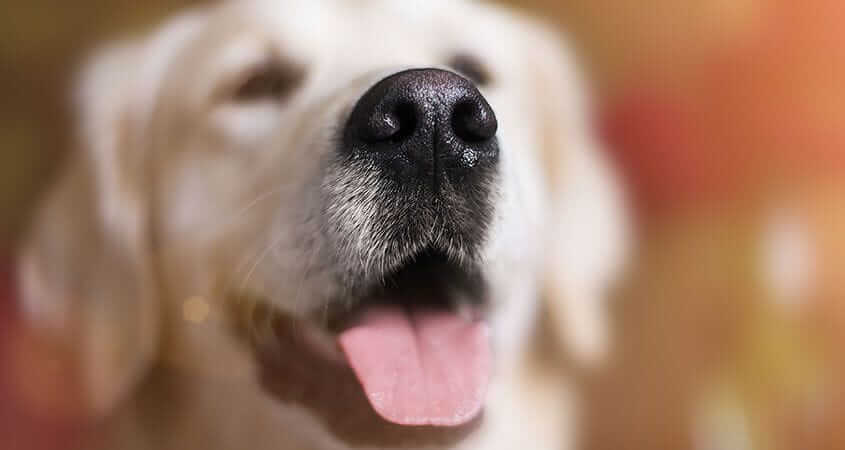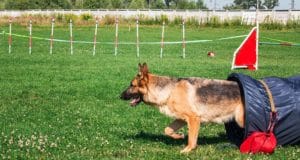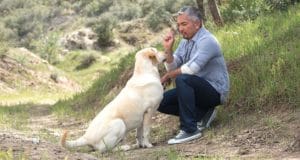If you own a dog, you are most likely familiar with the feeling of a wet, cold nose nuzzling you as your pup greets you each time you walk in the door. You may also be familiar with the feeling of a moist nose from a stranger’s dog as it sniffs your hand. Although the sensation of a wet nose may feel normal to any dog lover, have you ever asked yourself the question, “Why are dogs’ noses wet?”
The question of why a dog snout is wet may seem simple, but it has some interesting answers. Dogs’ noses are wet for numerous reasons, including the fact that their moist noses help increase their smelling abilities. Furthermore, a dog’s wet nose aids in maintaining a proper body temperature for your pup.
Still wondering why dogs’ noses are wet? Below, we’ll dive into the five reasons your dog has a wet nose as well as the truth behind a wet vs. dry dog nose.
5 Reasons Your Dog Has a Wet Nose
There are many interesting reasons why a dog’s snout is wet rather than completely dry. A wet nose helps a dog function in everyday life, such as when your dog tracks a scent or when he needs to cool off. Here, we’ve put together a list of the top five answers for the question, “Why are dogs’ noses wet?”
- Because they secrete mucus.
One of the main sources for the wetness of your dog’s nose is the mucus that is secreted. Although this may sound gross, it actually has some amazing benefits that serve vital functions for your dog.One main reason for this secretion is that it allows dogs to track certain smells. As you may already know, a dog’s sense of smell is 10,000 to 100,000 times sharper than a human’s. Why? Thanks to the thin layer of mucus on their noses, dogs can absorb scent chemicals and, therefore, smell better. - Because dogs tend to lick them a lot
Have you ever seen your dog lick his nose? If so, you’ve witnessed seeing just another reason for a dog’s wet nose. Although it makes obvious sense that dogs licking their noses makes their snouts wet, you may be asking the question, “Why do dogs lick noses?” Well, there’s a couple of reasons for this behavior.First, a dog’s snout can get dirty quite easily, especially when they’re digging in the yard or chowing down their food. By licking their noses, dogs clean their snouts. A second reason why dogs lick their noses is because of the aforementioned mucus. As your dog is sniffing certain scents, his nose gathers scent chemicals. A dog will lick these chemicals off so that the olfactory glands on the roof of his mouth can sample them, thus aiding in your dog’s smelling performance. (Learn more about dogs and licking from Cesar Milan’s response to a reader question.) - Because it helps them to cool down
As you probably already know, dogs do not have sweat glands throughout the body like humans do. This is why dogs must pant to cool off. But what you may not know is that dogs do have sweat glands in a couple of spots: their paws and their noses.
So how does a dog cool down? A dog’s wet nose allows the body to maintain its normal temperature and, hence, preventing serious health issues during warm weather. Similarly, a dog’s feet will perspire to prevent the dog from overheating and keep the pads from becoming too dry. - Because dogs’ noses tend to pick up moisture
If you’ve ever watched your dog sniffing around outside, you know that it’s an “all-in” process, as the nose is often being shoved right into grass, leaves, dirt and other debris.
In doing this, dogs’ noses often pick up moisture from the environment, making their noses cold and wet. - Because they’re born that way
Every dog is unique and individual, meaning certain dog breeds have colder, wetter noses than others due to genetics and other factors. Additionally, some dog breeds have an easier time licking their noses, resulting in moist snouts.
In the same way, some dogs naturally have dryer noses. This isn’t necessarily a concern as long as your dog doesn’t show any other symptoms of illness.
A Dry Nose Doesn’t Necessarily Mean Your Dog Is Sick
Now that we’ve answered the question “Why are dogs’ noses wet?”, it’s time to dispel a myth regarding a wet vs. dry dog nose. Most likely, you have heard the tales about how a hot, dry nose means your dog is sick. In fact, you may have even spent some time in the vet’s office due to this little piece of acquired knowledge. Although, in some cases, a dry nose can be an indicator of illness, it is a myth that healthy dogs can’t have dry snouts.
It’s been reasoned by vets that the moisture level of your dog’s nose has little to do with whether she’s sick. Some dog breeds naturally have wetter noses than others, and others have dryer noses because they can’t reach their noses quite as well. Thus, it is simply an old wives’ tale that a dog’s dry nose is a sign of illness.
Dog Nose Temperature and Moisture Level Fluctuates
Not only do certain dog breeds have wetter noses than others, but you may have noticed that the wetness of your dog’s nose changes throughout the day. This is because the temperature and moisture level of your dog’s nose likely fluctuates quite a bit on a normal day. Hence, it’s quite possible for your dog’s nose to be wet in the morning, dry in the middle of the day and slimy again in the evening. Also, it’s important to note that dogs can be sick even if their noses are cold and wet.
Instead of obsessing over the moisture level, you should keep an eye on the kind of discharge coming from your dog’s nose. If the dog mucus suddenly becomes crusty or gets thicker, this can be a sign that something is wrong.
There are so many types of dogs, ranging from hunting dogs, guard dogs, herding dogs and companion dogs to working dogs and more. Tell us which breed is yours in the comments below!











